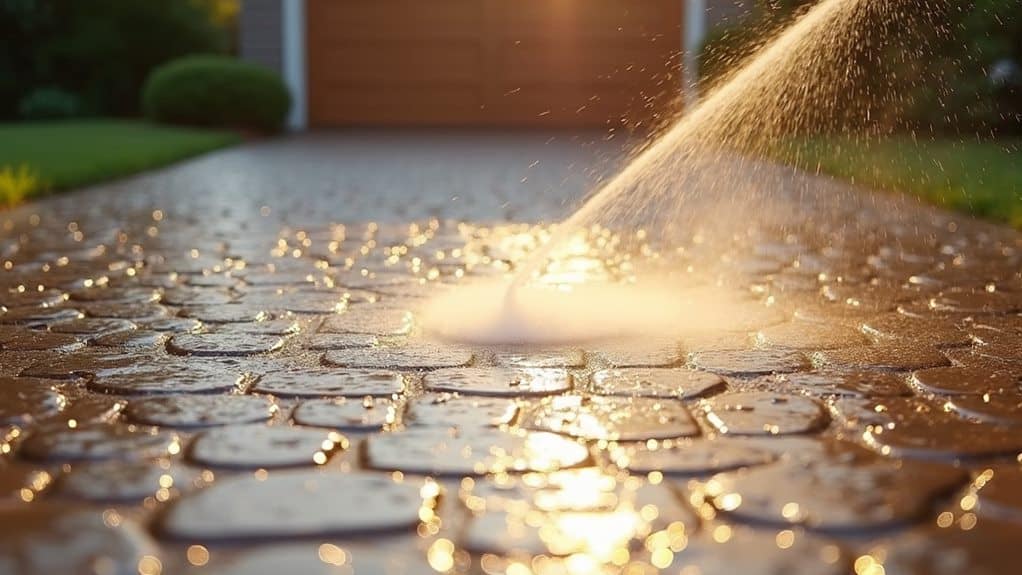Regular cleaning keeps your resin driveway looking smart and lasting longer.
Simply sweep weekly with a soft brush when dry, and tackle any spills straight away using washing-up liquid and warm water.
For a deeper clean, use a pressure washer set below 150 bar, keeping the nozzle 20cm away from the surface to avoid damage.
Give your driveway a thorough clean twice a year – spring and autumn work best.
Skip harsh chemicals like bleach or acid-based cleaners, as these can break down the resin bonding.
Much like caring for your car, proper maintenance of your driveway protects your investment.
Key Takeaways
Keep your resin driveway spotless with these key maintenance tips:
- Give the driveway a thorough sweep whilst dry every 1-2 weeks to stop moss taking hold and rubbish building up.
- When pressure washing, stick to 150 bar or less with a flat spray nozzle. Keep the lance 20cm away from the surface – about the length of a ruler.
- For nasty stains, sprinkle cat litter or bicarb straight away and let it soak up the mess. Then wash with washing-up liquid and a gentle scrub.
- Every three months, give it a proper clean with a soft brush and mild cleaner (like you’d use on your car). Avoid bleach or harsh chemicals – they’ll wreck the resin.
- Book a professional clean and reseal every few years. Think of it like servicing your car – it keeps everything protected and sorts out tough marks properly.
Essential Resin Driveway Cleaning Tools
Essential tools for your resin driveway include a pressure washer (max 150 bar) with a flat spray nozzle. This setup effectively cleans whilst protecting the surface.
Annual sealing shields against UV rays and can help your driveway last up to 25 years. Keep warm water, mild detergent and a soft-bristled brush handy for tackling stubborn marks.
For winter care, plastic or rubber shovels are vital for snow clearance, as metal ones can scratch the surface. A dedicated stiff brush works best for removing moss and algae.
Store all tools in a dry place and check them regularly to ensure they’re in good working order for routine maintenance.
Regular Sweeping and Basic Care
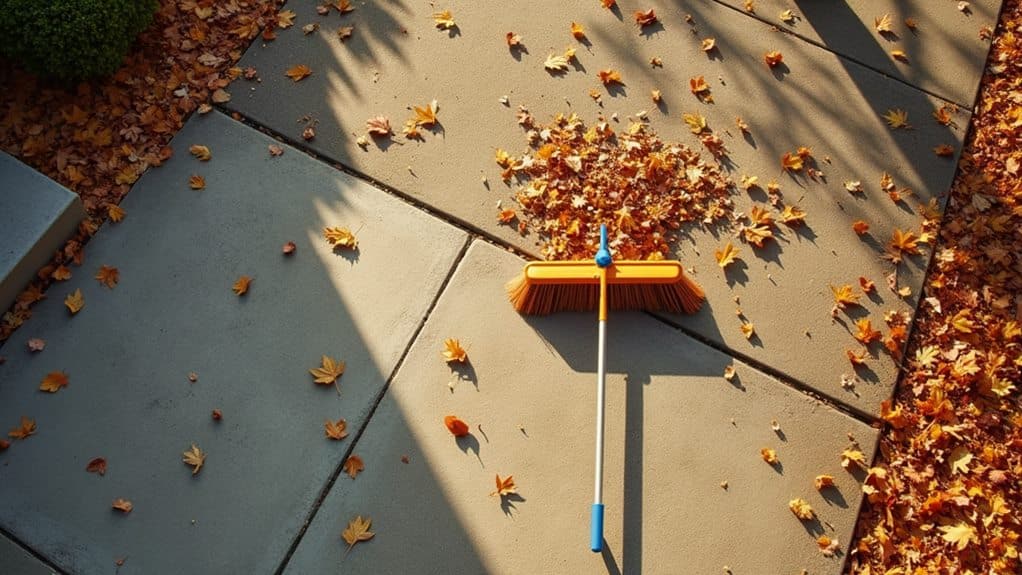
Regular Sweeping and Basic Care
Regular sweeping is your main defence against resin driveway deterioration. Sweep weekly or fortnightly with a stiff brush to stop moss and weeds taking hold. Use gentle pressure whilst sweeping to avoid surface damage. A professional clean every 2-3 years will protect your driveway and help it last up to 25 years.
Essential maintenance tips:
- Only sweep when dry to prevent mud and ensure thorough cleaning
- Keep proper tools handy – a sturdy brush and mild cleaning solution
- Check for stains or damage whilst sweeping
Focus on spots where leaves and dirt gather, as these areas need extra attention.
Regular sweeping stops organic matter building up, which can cause lasting damage. It’s better to sweep regularly than to let things build up and need a deep clean later.
This simple routine keeps your driveway looking smart and lasting longer.
Dealing With Stubborn Stains
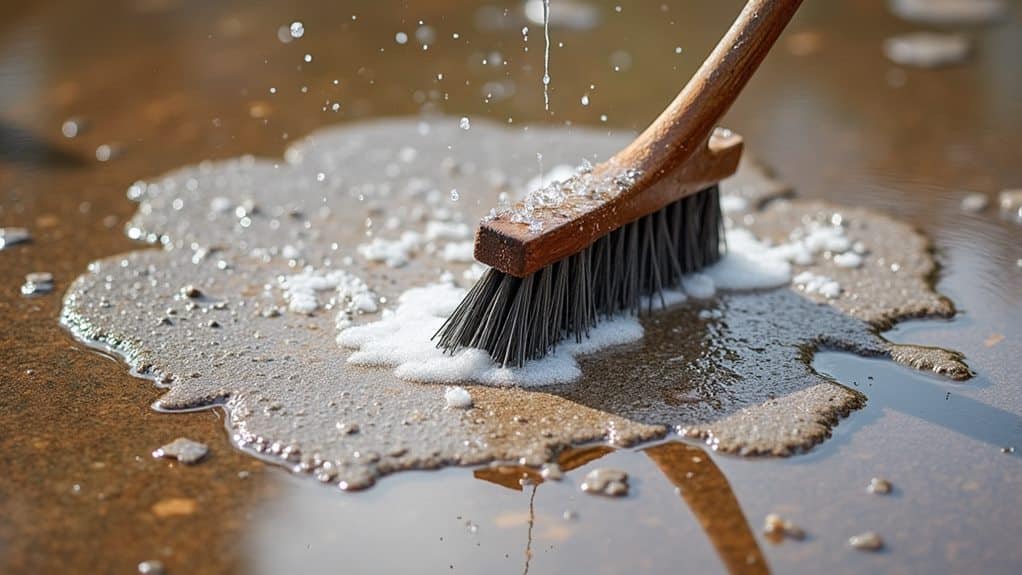
Test any cleaning solution on a small hidden area of your resin path before full application.
For oil stains, act swiftly – scatter cat litter or bicarbonate of soda to absorb the excess.
Mix washing-up liquid with warm water for stubborn marks, then scrub gently with a soft brush.
For tough grease spots, you may need to repeat the process, ensuring you rinse thoroughly between attempts.
Oil and Grease Removal
Oil and grease stains on resin driveways need swift action to prevent lasting damage. These common driveway nuisances can be effectively managed with the right approach.
For fresh spills:
- Immediately cover with cat litter or baking soda to absorb excess oil
- Leave for 15-20 minutes
- Sweep away thoroughly
To clean stubborn stains:
- Mix washing-up liquid with warm water
- Scrub gently with a soft brush
- Rinse well with clean water
For tougher stains, specialist degreasers from your local DIY shop can help. Always test new cleaning products on a small, hidden area first to ensure they won’t damage the resin.
Quick tips:
- Clean spills as soon as you spot them
- Check your driveway regularly, especially under parked vehicles
- Avoid harsh chemicals or wire brushes that might scratch the surface
- Give the area a thorough rinse after cleaning
Regular checks and prompt cleaning will keep your resin driveway looking smart and prevent permanent staining.
A quarterly deep clean helps maintain its appearance and durability.
Tackling Deep-Set Marks
Deep-set marks on resin driveways need swift, methodical treatment. When spots appear, quickly blot any excess liquid with a clean cloth to stop it seeping further into the resin.
Using correct cleaning methods whilst avoiding harsh chemicals will protect your driveway’s surface during the cleaning process.
For tough stains, mix mild washing-up liquid with warm water. Apply to the marked area and scrub gently with a soft brush using circular movements. Mind you don’t press too hard, as this risks damaging the resin.
Always rinse thoroughly with clean water to wash away any soap residue.
For oil stains, first spread cat litter or bicarbonate of soda over the mark. Leave it for several hours to absorb the oil before cleaning with the detergent solution.
When using specialist resin cleaners, test on a small, hidden area first to check it won’t harm your driveway’s finish.
Pressure Washing Best Practices
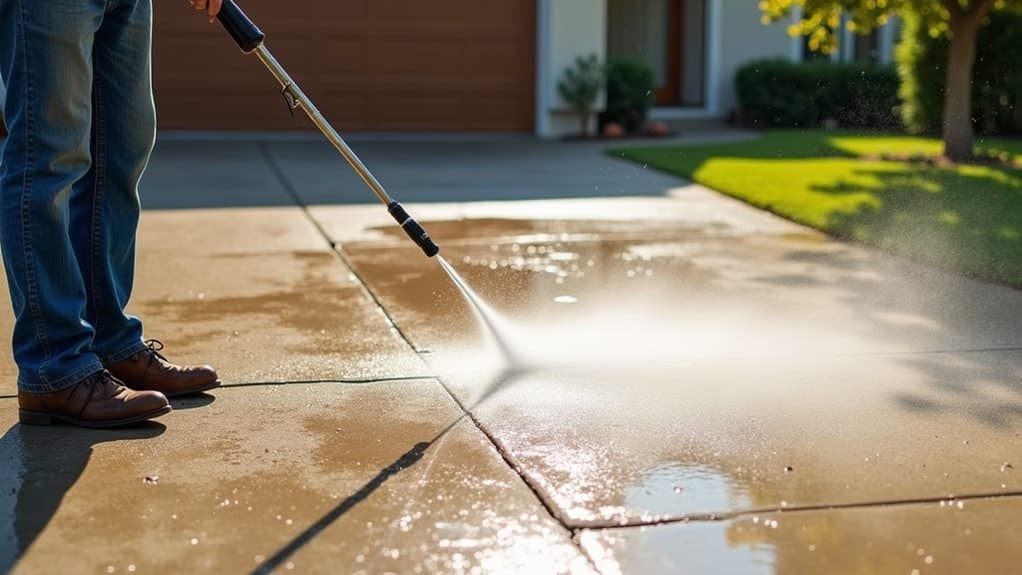
Mix a gentle cleaning solution with your pressure washer for better results on tough stains whilst protecting the surface.
For resin driveways, never exceed 150 bar pressure and opt for a flat spray nozzle to prevent damage.
Keep the nozzle at least 20cm from the surface, using smooth, steady movements to avoid harming the resin and stones.
Before starting, double-check your pressure washer settings and use either cool or lukewarm water – hot water can damage the resin bonding.
Safe Pressure Settings Guide
Correct pressure settings are vital for safe resin driveway cleaning. Keep water pressure under 150 bar to avoid damage whilst ensuring a thorough clean. Always do a patch test before using any cleaning solutions.
A flat spray nozzle works best to spread water evenly across your driveway, protecting the resin bond and shifting dirt effectively.
Key guidelines for best results:
- Keep the nozzle at least 20cm from the surface to prevent loose stones and resin damage
- Use cool (not freezing) water to stop the resin from cracking
- Clean on dry days to allow proper drying time
Start with a small test area to check your pressure settings.
Regular cleaning with the right pressure will keep your driveway looking smart and lasting longer.
Nozzle Distance and Technique
Proper nozzle control is crucial for safe resin driveway cleaning. Keep the nozzle at least 20 cm from the surface to protect the resin coating. Regular cleaning prevents debris build-up and can help your driveway last up to 25 years. A flat spray nozzle at the right distance ensures even coverage without damaging the surface.
Start by rinsing the entire surface with cool water at low pressure to loosen dirt and grime. Never exceed 150 bar pressure, as this can damage the resin – much like using a power hose too close to window seals.
Check your nozzle regularly for wear or blockages, as these can create uneven spray patterns that might harm the surface. Move the pressure washer in steady, overlapping strokes – think of mowing a lawn – whilst maintaining consistent distance and angle.
These simple steps will keep your resin driveway looking fresh and protect your investment.
Seasonal Maintenance Requirements
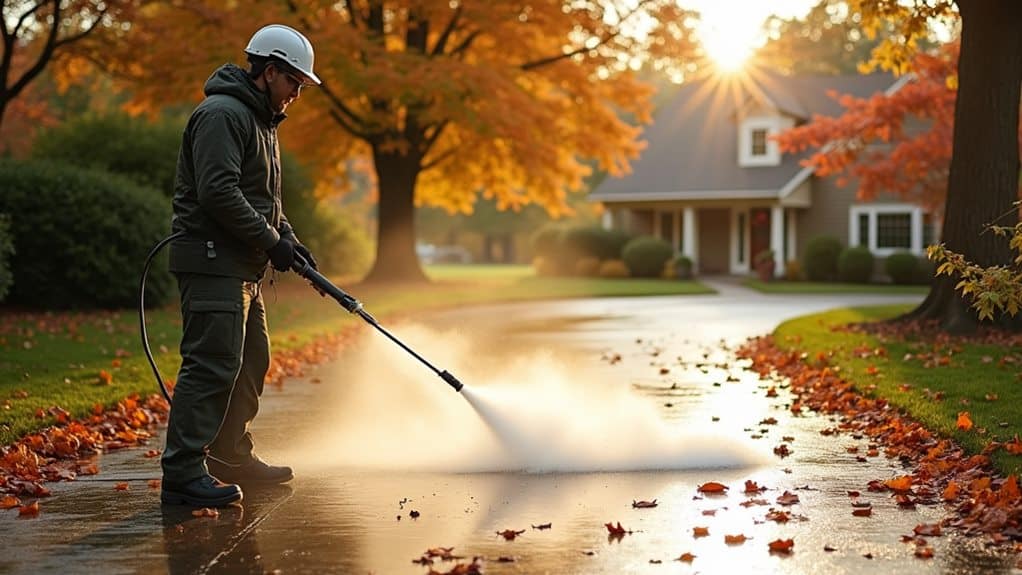
Resin driveways need minimal upkeep, but twice-yearly maintenance in spring and autumn ensures lasting performance. A proper maintenance routine, combined with professional resealing every 2-3 years, can help your driveway last beyond 25 years.
Essential seasonal maintenance tasks:
- Sweep regularly with a stiff broom to clear debris and prevent weeds
- Pressure wash at low settings (under 150 bar), keeping 20cm from the surface
- Check for water pooling and drainage problems after heavy rain
Watch for signs that indicate resealing is needed, as this protects against UV damage and vehicle weight.
After storms, inspect your driveway thoroughly and clear any debris straight away. This simple maintenance keeps your resin driveway in top condition whilst maintaining its low-maintenance benefits.
Professional Cleaning and Resealing Tips
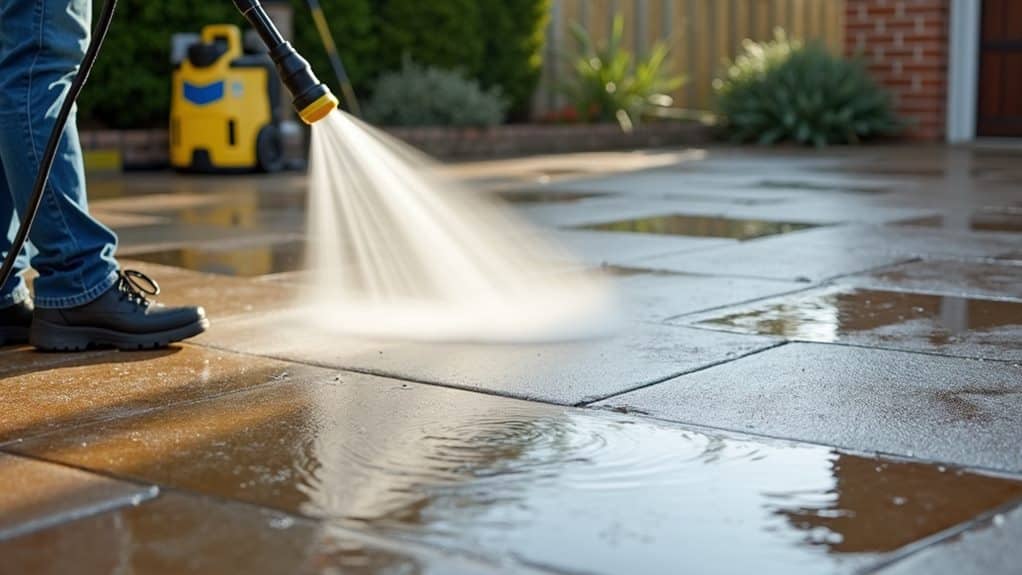
Professional cleaning and resealing are essential for maintaining your resin driveway’s lifespan.
Professional cleaners use powerful jet washing equipment to remove ingrained dirt and tough stains, keeping your driveway looking its best. Gentle cleaning solutions protect against fading, whilst quick action on oil spills prevents lasting damage.
The resealing process, needed every few years, is best left to the experts. Professional contractors apply fresh resin that reinforces your driveway’s surface and blocks weeds by sealing small cracks. This protective coating guards against sun damage, rain and the weight of parked vehicles.
Though DIY might save money initially, professional services ensure proper techniques and materials are used. You’ll avoid costly mistakes from wrong cleaning methods or poor application.
Most trusted contractors offer workmanship guarantees, giving peace of mind about the quality of service. Professional maintenance is an investment that protects your driveway and extends its life considerably.
Frequently Asked Questions
What Is the Best Thing to Clean a Resin Driveway With?
A mix of eco-friendly cleaners or mild detergent with warm water works brilliantly for resin driveways. For best results, use a pressure washer set below 150 bar (like those commonly found at most UK DIY shops) and pair it with a soft-bristled driveway brush. This gentle approach effectively removes dirt whilst protecting your driveway’s finish.
What Maintenance Does a Resin Driveway Need?
Regular maintenance of your resin driveway includes weekly sweeping, annual pressure washing and resealing every 3-4 years. Keep an eye out for any cracks, tackle stains straight away with soapy water, and ensure drainage channels remain clear of debris. Regular checks and swift repairs will keep your driveway in top condition throughout the British weather.
Can You Pressure Wash a Resin Driveway?
Pressure washing a resin driveway is safe when done properly. Keep the pressure under 150 bar (2,175 psi), maintain a 20cm distance from the surface, and use a flat spray setting. These precautions will protect your resin surface whilst ensuring an effective clean.
How Do I Stop Moss From Growing on My Resin Driveway?
Keep moss at bay by regularly brushing your resin driveway and ensuring proper drainage. Apply eco-friendly cleaners like white vinegar or specialised British driveway solutions. A quality UV-resistant sealant works brilliantly to protect the surface, whilst seasonal maintenance checks help spot issues early. Pop on some moss and algae inhibitor twice yearly – autumn and spring work best – to maintain your driveway’s smart appearance and grip.
Conclusion
Regular maintenance is essential for your resin driveway’s long-term performance. A simple routine of weekly sweeping, prompt stain removal and yearly pressure washing will keep your surface in top condition. Your driveway might need extra attention during autumn when leaves fall, or winter when ice forms. Consider professional resealing every few years to maintain the surface’s protective qualities. A properly maintained resin driveway remains a valuable asset to your property.
